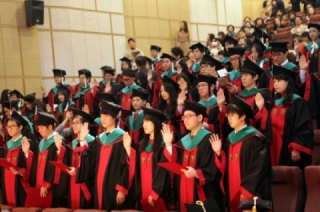Weighed by growing fears of the spread of the novel coronavirus (COVID-19), most medical and nursing schools have either canceled or delayed graduation ceremonies.
With commencement ceremonies canceled at medical schools, graduate medical schools, and nursing schools, graduates will have almost no chance to recite the “Hippocratic Oath” or the “Nightingale Pledge.”

All the 40 universities that have a college of medicine and graduate medical school notified students of the graduation ceremony nullification, except for Seoul National University, Sungkyunkwan University, and Gyeongsang National University. Sungkyunkwan University and Gyeongsang National University are discussing whether to cancel the event.
Seoul National University is the only school that holds a graduation ceremony, which will take place on Feb. 26-27. To minimize the risk of virus transmission, only a small number of students representing their respective departments are likely to participate in the ceremony without any invitation of people from outside.
Some schools decided to delay the ceremony until summer graduations in July or August. Gachon University, Konkuk University, University of Ulsan, Yonsei University, Inha University, and Chung-Ang University will do so. Hanyang University graduates can choose to participate in the summer graduation as well. Chungnam National University decided to give discretion to each department if the event is to gather fewer than 100 people without visitors such as parents and relatives.
Traditionally, medical and nursing school graduates take the Hippocratic Oath and the Nightingale Pledge to commit themselves to their best abilities as healthcare professionals before clinical practice.
The Hippocratic Oath at graduation states physicians’ ethics and responsibility for patients. Korean medical school graduates take the Declaration of Geneva, the modern version revised in 1948. It is a tradition of Korean medical school graduates to read it aloud in white gowns.
The Nightingale Pledge states nursing ethics and principles. Since U.S. graduates of a nursing school first took the oath at the graduation ceremony, Korean nursing colleges have followed the tradition. Reciting the oath aims to establish an identity as a professional nurse.
Even if universities hold summer graduation ceremonies in July or August, medical school graduates will find it almost impossible to attend the event due to internship training.
Some schools consoled graduates by establishing a photo zone within the campus.
Yonsei University Wonju College of Medicine said it would have a photo zone in front of the Medicine Hall until Feb. 14. Students can borrow a graduation gown and cap for a picture. Chonnam National University graduates can do so, too.
Kyunghee University comforted graduates by putting a graduation congratulatory speech by the head of the college of medicine on the school’s homepage.
“It's too bad that the graduation ceremony was canceled, and you could not help but get a little mad,” said Woo Jeong-taek, head of Kyunghee University Graduate School of Medicin, “However, it would have been also an opportunity to give you a comfortable time because you have been only focusing on extensive medical studies. I hope you can broaden your sights and communicate with many things in the world.”

